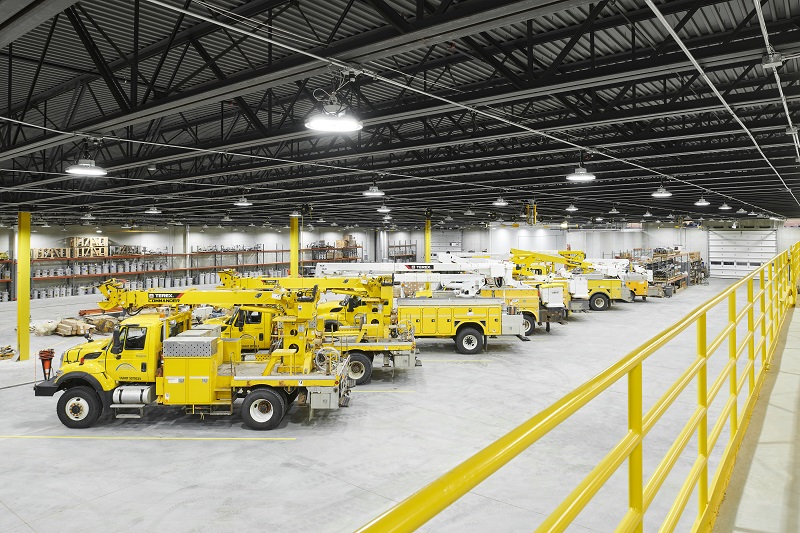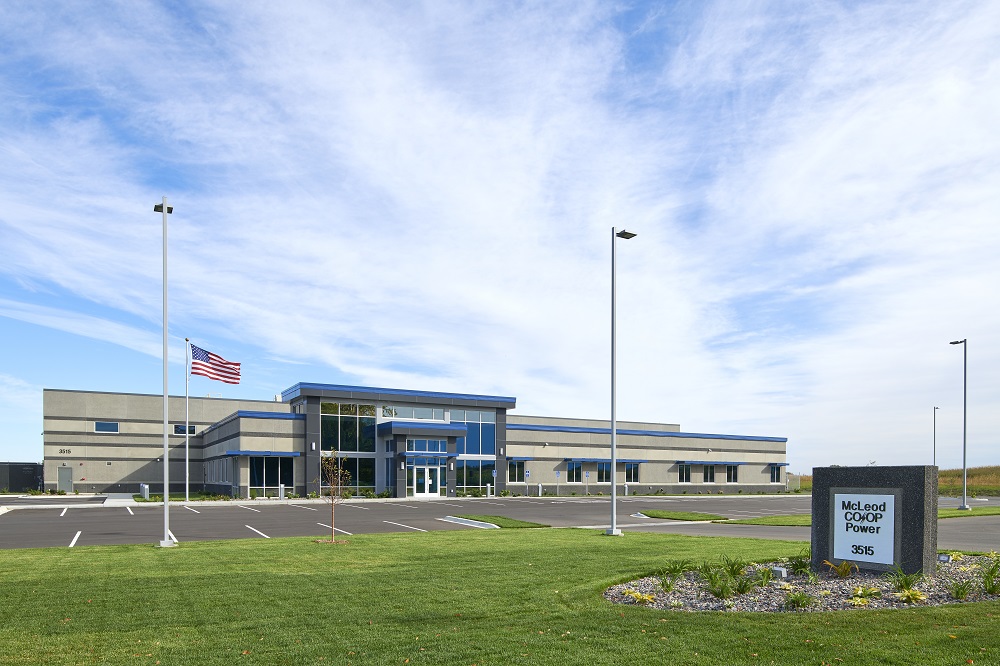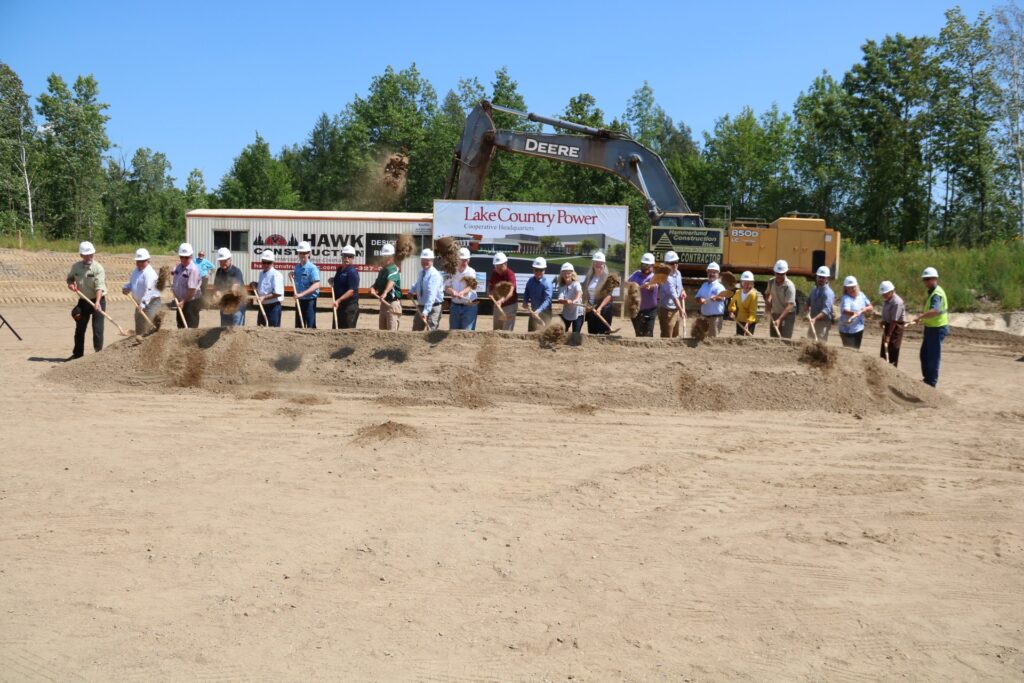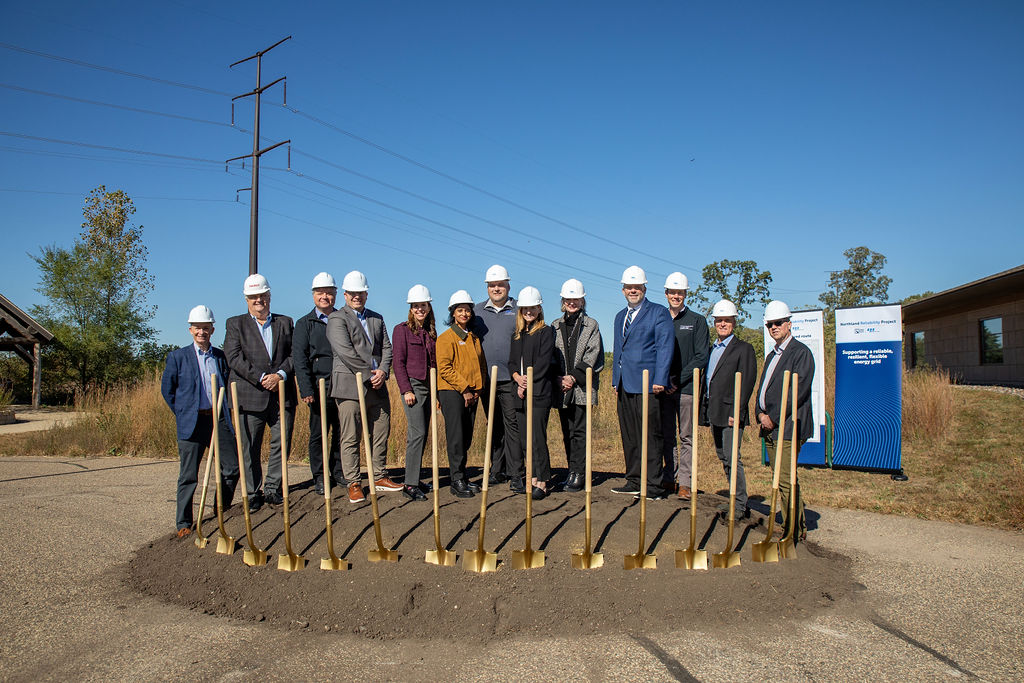Electric cooperatives serve their members with the electric power necessary for community businesses and residents to operate and live as they prefer. The economic development services cooperatives provide are also some of the most critical resources that local projects and communities need.
But sometimes, the cooperatives are the economic development projects themselves. For example, some of Great River Energy’s member-owner cooperatives own older buildings no longer adequate for their operational needs. Several cooperatives have recently replaced or upgraded their facilities, some dating back to the 1950s. At first glance, these facilities may appear to be just simple buildings or storage spaces for fleet vehicles, but they represent a significant investment in the local community’s economic development.
McLeod Cooperative Power
McLeod Cooperative Power (McLeod) knew it needed more warehouse and garage space. The co-op spent several decades finding creative ways to fit 21st-century trucks and equipment into a small 1950s-era garage.
“Equipment has increased in size so much that it has become difficult to fit many pieces in the old building,” said Bob Thomes, McLeod’s assistant member services manager. “We had to modify mirrors on some vehicles to allow them to fit in the garage.”
Additionally, while the old garage space was in downtown Glencoe, the cooperative kept a storage facility offsite where wire, poles, trailers and other equipment and supplies had to sit outside. Offsite materials storage created inefficiencies as well as additional travel time.

McLeod eventually moved into a new headquarters building in Glencoe’s East Industrial Park in August 2020. The 62,420-square-foot facility includes more than 40,000 square feet of warehouse and garage space and nearly 12,000 square feet of lobby, office and meeting space. An additional 42,750-square-foot outdoor pole yard and storage space sit on the approximate 10-acre lot. The entire project construction cost was approximately $9.2 million.
By consolidating all of its resources at one facility, McLeod has improved response times in emergencies, provided better service to member-owners and ensured its ability to serve the community well into the future.
“We had outgrown our existing facilities, which led to many operational inefficiencies,” said Dan Ehrke, McLeod’s member services manager. “The new location allows us to be more efficient. The new facility’s location off U.S. Highway 212 has also been a key advantage for servicing our members across our large territory.”
Great River Energy was instrumental to McLeod’s project by facilitating tours of several other member cooperative buildings that had undergone similar projects. McLeod is appreciative of the support that other cooperatives provided and is confident that as the region grows, the new facility will enable it to meet members’ evolving needs.
Additionally, McLeod’s project offers significant momentum for Glencoe itself as the city begins undertaking a feasibility study for further expansion to its East Industrial Park. The cooperative found itself involved in a sidebar of economic development as it sought to sell its old facility. Sam’s Tire Service in Glencoe experienced a fire at its facility in October 2020 that left the business scrambling for space. McLeod offered Sam’s the temporary use of its old facility.
“What began as just being a good neighbor evolved into Sam’s purchasing the building from us because the building was a great fit for their business,” Ehrke said. “They have since built a significant addition onto the facility, so the whole experience has been terrific for the community, with two local companies re-establishing their long-term home in Glencoe.”
Lake Country Power
Lake Country Power (LCP) moved into a new facility in the Cohasset Industrial Park in 2019. Its previous Grand Rapids location was in a 50-year-old building that was outdated, crowded and needed significant improvements.
The former property sat on a pie-shaped, severely sloping lot that presented a dangerous intersection with U.S. Highway 2 for employees and members. Several aspects of the Grand Rapids location also created inefficiencies, including a detached pole yard, significant outside storage of materials and equipment, and garage space not designed to accommodate the larger size of modern bucket trucks and digger derricks.
Groundbreaking on the new $12 million facility occurred on July 31, 2018, with the first day of operation on Oct. 14, 2019. The 62,468-square-foot facility includes 40,740 square feet of garage/storage space with nearly 30-foot-long side walls, in-floor heating and the ability for LCP trucks and equipment to drive in one end and out the other. The location includes a fully fenced, secure pole yard with a 4,600-square-foot cold storage building.
The office space has designated functional areas with engineering, operations, community relations and member service, information technology, human resources and administrative teams. The result improves employee efficiency and fosters teamwork, innovation and communication. Other attributes of the new facility include a state-of-the-art security system, geothermal heating and cooling systems, a solar wall that pre-heats the air entering our HVAC system and native Minnesota landscaping.
“This space is a vast improvement from the old location, allowing us to store all our large trucks, equipment and fleet of small vehicles inside a secure location protected from the elements,” said Mark Bakk, general manager at LCP. “This new garage space also includes adequate warehousing space to protect our line materials from the weather.”
The city of Cohasset benefited from LCP’s investment as well. Beyond providing significant momentum toward bolstering the local tax base, the project helped further economic development and investment in the community by helping it expand into a second phase for the Cohasset Industrial Park. At the time of LCP’s process to locate a site and construct a new facility, Cohasset was considering a $4.5 million expansion to the park, which was 95% full. LCP was the first anchor in the expansion and four other businesses have followed.
“Beyond the jobs brought to the area, the visibility of Lake Country Power’s facility in the park itself helped drive investment from other parties,” Bakk said.
Todd-Wadena Electric Cooperative
Todd-Wadena Electric Cooperative moved into a new headquarters building in late 2020 on its existing site. The nearly $3 million project replaced a building the cooperative had utilized for over 70 years but had experienced aging issues, such as significant exterior brick deterioration, a poor HVAC system and frequent flooding in the lower level parking.
The project improved work efficiencies for employees through a large multi-purpose room and allowed for easier collaboration with members through a dedicated conference room. Space in the new lobby offers member learning experiences through displays and demonstrations.
These are just a few examples of how Great River Energy’s member-owner cooperatives are investing in their communities, expanding their facilities and deploying new equipment to better serve the needs of residents and member businesses. This commitment to their communities will ensure a higher level of service availability and reliability— even in the most rural areas.


 " data-object-fit="cover">
" data-object-fit="cover">